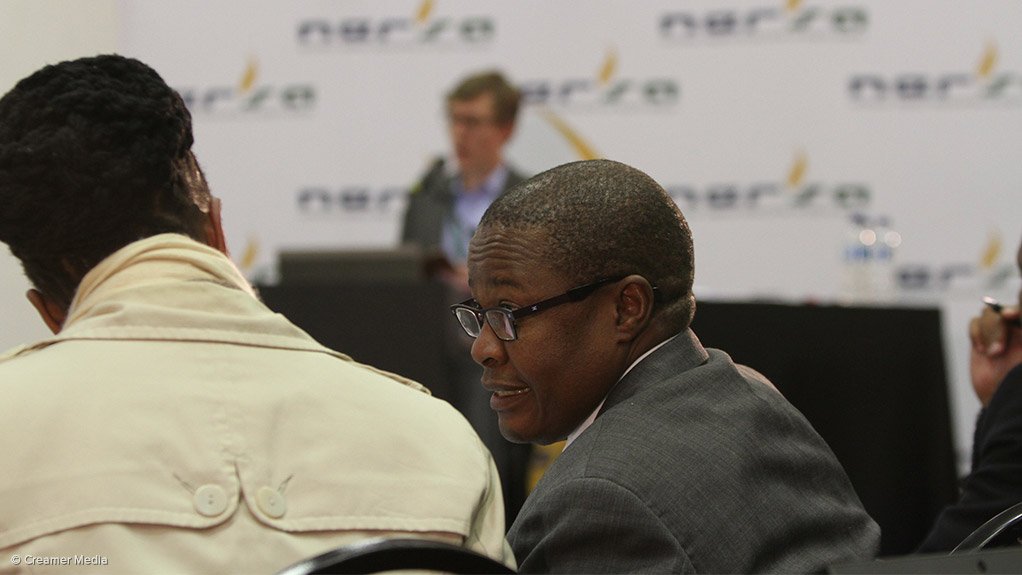Acting Eskom CEO Brian Molefe came out swinging at the conclusion of public hearings into the utility’s request for an additional tariff hike during 2015/16 to enable it to pay for diesel and short-term power contracts with private generators.
The hearings were convened by the National Energy Regulator of South Africa (Nersa) after Eskom applied for a “selective” reopening of its third multi-year price determination, which, if approved, would raise the electricity tariffs for the year to 25.3%, from the 12.69% already sanctioned.
Addressing “matters arising” from the two-day assembly, held at Nasrec, near Soweto, Molefe immediately went on the offensive, accusing Nersa of failing to make a decision on the reopener by May 13, as it had committed to do in a May 11 letter to the Public Enterprises Minister Lynne Brown.
The decision was key to meeting the deadline – extended by Finance Minister Nhlanhla Nene from March 15 to May 15 – for the tabling of guidelines for municipalities on the treatment of bulk electricity price increases for their financial years beginning on July 1, 2016.
Nersa’s Thembani Bukula immediately interjected by stating that the regulator had indeed made a decision by May 13, the outcome of which was the public-hearings process on June 23 and 24, which would culminate in a June 29 determination.
Nersa chairperson Jacob Modise later also questioned Molefe’s combative stance on the matter and suggested that the Eskom executive had engaged in a “selective” reading of copious correspondence between the regulator, the utility and the Minister.
However, the issue was critical to Eskom’s application, as the National Treasury had subsequently issued a circular informing municipalities that any additional bulk electricity price increases approved by Nersa after May 15 would need to be “deferred” to the 2016/17 financial year, which would start on July 1 next year.
That complicated the implementation of any possible tariff increase determined on June 29, as municipalities would be prevented from passing the increase on to residents, which would place their finances, and potentially some services, under strain.
Molefe also refuted Bukula’s earlier assertion that he was in possession of a letter from Nene informing him of the restriction on municipal tariff increases, the implications of which could have a significant bearing on whether Nersa could in fact grant the out-of-cycle increase being sought.
Molefe also asserted that Nersa should, nevertheless, proceed in making a determination on the merits of the application before it, regardless of the circular, reporting that it had secured legal opinion confirming that the Finance Minister had discretion to approve a further extension should one be deemed necessary.
There was an equally tense standoff between Molefe and Bukula on the issues of post-maintenance breakdowns at the coal-fired power stations, which was identified by the regulator as a key reasons for a decline in Eskom’s energy availability factor to below 75%.
Molefe dismissed a Nersa assertion that 50% of its units broke down soon after maintenance had been performed, owing to the repairs being of a poor quality. He argued the regulator had misinterpreted a graph, which showed a snapshot of post-maintenance breakdowns, but which did not distinguish whether this had been caused by poor quality workmanship or the age of the unit.
Eskom said post-maintenance breakdowns arising due to quality problems were below 10%, with the balance attributable to the fact that the scope on maintenance had been below what was required for plants that were in their mid-lives.
Molefe also stressed that alternative funding options were being interrogated, including the sale of assets or equity, but argued that emergency tariff increases were still required to fund the two near-term options for lowering the risk of load-shedding: using the open-cycle gas-turbines (OCGTs) more extensively and contracting with generators under its short-term power purchase programme.
He concluded by arguing that the economic cost of using the OCGTs, at R2.30/kWh, was six times lower than the cost of unserved electricity, which had been independently estimated at R15/kWh.
EMAIL THIS ARTICLE SAVE THIS ARTICLE
To subscribe email subscriptions@creamermedia.co.za or click here
To advertise email advertising@creamermedia.co.za or click here











